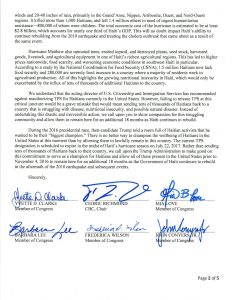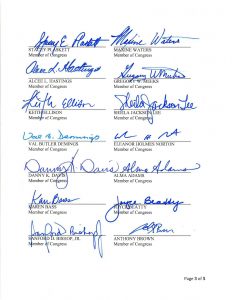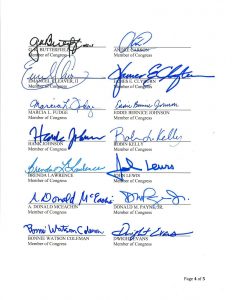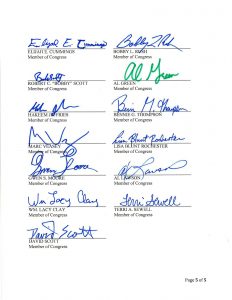



TEXT:
May 2, 2017
The Honorable John F. Kelly
Secretary
U.S. Department of Homeland Security
Washington, D.C. 20528
Dear Secretary Kelly,
We, the entire bipartisan delegation of Congressional Black Caucus Members from the U.S. House of Representatives, write to urge you to extend the existing Temporary Protected Status (TPS) designation for Haiti by 18 months and to include all Haitians present in the United States prior to November 4, 2016, in a new TPS designation. Haiti was added to the list of TPS-designated countries on January 21, 2010, following the catastrophic earthquake that killed over 300,000 men, women, and children. It has since been re-designated three times for 18 months, with each extension granted in light of ongoing humanitarian concerns in Haiti. While the political situation in Haiti is stabilizing, Haiti still faces extraordinary and temporary conditions that justify the extension of TPS for another 18 months.
The January 12, 2010, earthquake killed more than 300,000 men, women, and children without warning. It also injured approximately 300,000 other Haitians and internally displaced 1.5 million Haitians within their own country. The earthquake destroyed more than 100,000 homes and damaged nearly 200,000 others, creating over $8 billion worth of damage in a country whose GDP the prior year stood at less than $6.6 billion. The earthquake also impacted core state functions by harming or destroying nearly 4,000 schools and killing 25 percent of government workers in Port au Prince alone.
While the international community provided billions of dollars in foreign aid to Haiti, it also unintentionally introduced cholera to the country. The cholera epidemic has by some estimates now killed more than 10,000 Haitians. The incidence of new cholera cases appeared to be decreasing at the end of 2015 in conjunction with the dry season. However, Hurricane Matthew exacerbated this persistent remnant of the 2010 earthquake by spreading cholera and other water-borne diseases across Haiti. As a result, the rate of cholera cases in Haiti increased by 40 percent since then and the United Nations Office for the Coordination of Humanitarian Affairs (UNOCHA) estimates that 30,000 more Haitians will be infected with cholera in 2017 alone. Haiti now accounts for nearly 20 percent of global cholera cases, which serve as an ongoing reminder of the tragic events of January 12, 2010.
Furthermore, Hurricane Matthew caused other damage that exacerbated the nation’s recovery. The hurricane hit Haiti on October 4, 2016, unleashing 150 mph winds and 20-40 inches of rain, primarily in the Grand’Anse, Nippes, Artibonite, Ouest, and Nord-Ouest regions. It killed more than 1,000 Haitians, and left 1.4 million others in need of urgent humanitarian assistance—800,000 of whom were children. The total economic cost of the hurricane is estimated to be at least $2.8 billion, which accounts for nearly one third of Haiti’s GDP. This will no doubt impact Haiti’s ability to continue rebuilding from the 2010 earthquake and treating the cholera outbreak that came about as a result of the same event.
Hurricane Matthew also uprooted trees, eroded topsoil, and destroyed plants, seed stock, harvested goods, livestock, and agricultural equipment in one of Haiti’s richest agricultural regions. This has led to higher prices nationwide, food scarcity, and worsening economic conditions in southwest Haiti in particular. According to a study by the National Coordination for Food Security (CSNA), 1.5 million Haitians now lack food security and 280,000 are severely food insecure in a country where a majority of residents work in agricultural production. All of this highlights the growing nutritional insecurity in Haiti, which would only be exacerbated by the influx of tens of thousands of additional Haitians to the country.
We understand that the acting director of U.S. Citizenship and Immigration Services has recommended against reauthorizing TPS for Haitians currently in the United States. However, failing to reissue TPS at this critical juncture would be a grave mistake that would mean sending tens of thousands of Haitians back to a country that is struggling with disease, nutritional insecurity, and possible natural disaster. Instead of undertaking this drastic and irreversible action, we call upon you to show compassion for this struggling community and allow them to remain here for an additional 18 months as Haiti continues to rebuild.
During the 2016 presidential race, then-candidate Trump told a room full of Haitian activists that he wanted to be their “biggest champion.” There is no better way to champion the wellbeing of Haitians in the United States at this moment than by allowing them to lawfully remain in this country. The current TPS designation is scheduled to expire in the midst of Haiti’s hurricane season on July 22, 2017. Rather than sending tens of thousands of Haitians back to their country, we call upon the Trump Administration to make good on this commitment to serve as a champion for Haitians and allow all of those present in the United States prior to November 4, 2016 to remain here for an additional 18 months as the Government of Haiti continues to rebuild in the aftermath of the 2010 earthquake and subsequent events.
